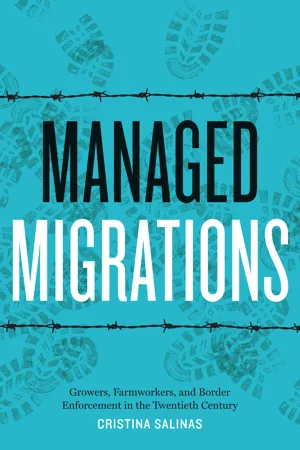
Managed Migrations
Growers, Farmworkers, and Border Enforcement in the Twentieth Century
- 286 pages
- English
- ePUB (mobile friendly)
- Available on iOS & Android
Managed Migrations
Growers, Farmworkers, and Border Enforcement in the Twentieth Century
About this book
2020 National Association for Chicana and Chicano Studies (NACCS) Book Award Winner
Honorable Mention, Ramirez Family Award for Most Significant Scholarly Book, Texas Institute of Letters, 2019
Managed Migrations examines the concurrent development of a border agricultural industry and changing methods of border enforcement in the Rio Grande Valley of Texas during the past century.
Needed at one moment, scorned at others, Mexican agricultural workers have moved back and forth across the US–Mexico border for the past century. In South Texas, Anglo growers' dreams of creating a modern agricultural empire depended on continuous access to Mexican workers. While this access was officially regulated by immigration laws and policy promulgated in Washington, DC, in practice the migration of Mexican labor involved daily, on-the-ground negotiations among growers, workers, and the US Border Patrol. In a very real sense, these groups set the parameters of border enforcement policy.
Managed Migrations examines the relationship between immigration laws and policy and the agricultural labor relations of growers and workers in South Texas and El Paso during the 1940s and 1950s. Cristina Salinas argues that immigration law was mainly enacted not in embassies or the halls of Congress but on the ground, as a result of daily decisions by the Border Patrol that growers and workers negotiated and contested. She describes how the INS devised techniques to facilitate high-volume yearly deportations and shows how the agency used these enforcement practices to manage the seasonal agricultural labor migration across the border. Her pioneering research reveals the great extent to which immigration policy was made at the local level, as well as the agency of Mexican farmworkers who managed to maintain their mobility and kinship networks despite the constraints of grower paternalism and enforcement actions by the Border Patrol.
Frequently asked questions
- Essential is ideal for learners and professionals who enjoy exploring a wide range of subjects. Access the Essential Library with 800,000+ trusted titles and best-sellers across business, personal growth, and the humanities. Includes unlimited reading time and Standard Read Aloud voice.
- Complete: Perfect for advanced learners and researchers needing full, unrestricted access. Unlock 1.4M+ books across hundreds of subjects, including academic and specialized titles. The Complete Plan also includes advanced features like Premium Read Aloud and Research Assistant.
Please note we cannot support devices running on iOS 13 and Android 7 or earlier. Learn more about using the app.
Information
Table of contents
- Cover
- Series Page
- Frontispiece
- Title Page
- Copyright
- Dedication
- Contents
- Acknowledgments
- Introduction
- 1. “Where Uncle Sam Meets Mexico”: Narratives of Frontier and Progress in Early Twentieth-Century South Texas
- 2. The Social Space of Agriculture
- 3. The Flexible Border: Mobility within Restriction in US Immigration Laws and Enforcement
- 4. Exploitative Villains or Community Leaders? Agricultural Labor Contractors, the State, and Control over Worker Mobility
- 5. El Paso/The Passage: The 1948 El Paso Incident and the Politics of Mobility
- 6. The High Price of Immigration Politics during the 1950s
- Epilogue
- Notes
- Bibliography
- Index